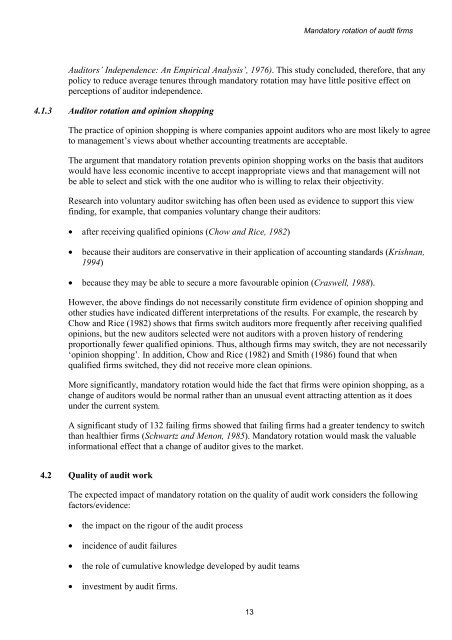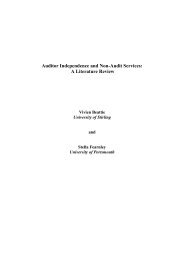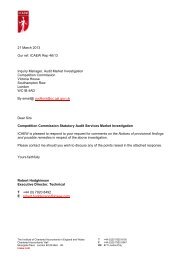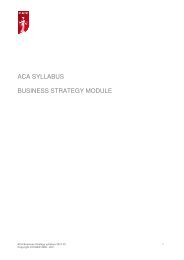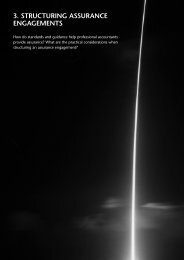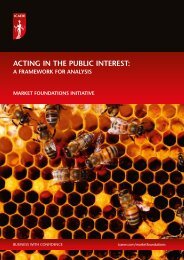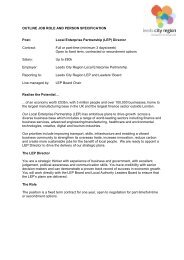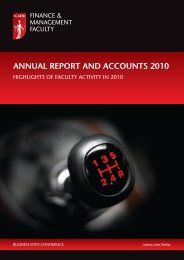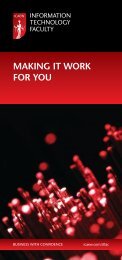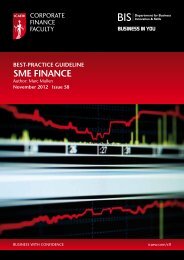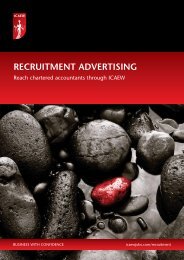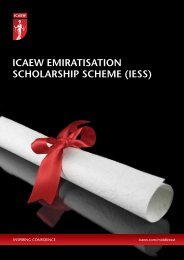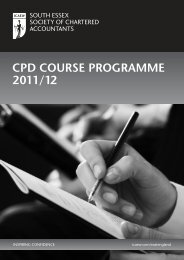<strong>Mandatory</strong> <strong>rotation</strong> <strong>of</strong> <strong>audit</strong> <strong>firms</strong>The belief that <strong>rotation</strong> would enhance independence was originally put forward by a variety <strong>of</strong>individuals and committees. These included the Cadbury Committee (‘The Financial Aspects <strong>of</strong>Corporate Governance’, December 1992), the Irish Review Group on Auditing (‘The Report <strong>of</strong> theReview Group on Auditing’, 2001) and the AICPA (‘Statement <strong>of</strong> position regarding mandatoryRotation <strong>of</strong> <strong>audit</strong> <strong>firms</strong> <strong>of</strong> publicly held companies’, 1992). However, the groups all subsequentlyconcluded that the disadvantages <strong>of</strong> <strong>rotation</strong> outweigh the advantages. The AICPA also explainsthat this suggestion has been studied by a number <strong>of</strong> influential bodies in the US, including thePublic Oversight Board, Commission on Auditors’ Responsibilities and the National Commissionon Fraudulent Financial Reporting, all <strong>of</strong> whom concluded that the perceived benefits <strong>of</strong> <strong>rotation</strong><strong>audit</strong> forms are outweighed by the associated costs.Further, some parties have argued that the improvement in objectivity and independence cannot besupported.In Spain, Pr<strong>of</strong>essors Arrunada and Paz-Ares (1995) performed a detailed study entitled ‘Theeconomic consequences <strong>of</strong> mandatory <strong>audit</strong>or <strong>rotation</strong>’. This included a critical examination <strong>of</strong> theargument that a lengthy <strong>audit</strong>or-client relationship may be prejudicial to the <strong>audit</strong>ors’ neutralityand impartiality. Their examination <strong>of</strong> this argument focused on the presumption that collusionbetween the client management and the <strong>audit</strong>ors may be facilitated in a lengthy relationship, andthat the expectation <strong>of</strong> economic gains for the <strong>audit</strong> firm may impair their judgement andindependence. Following their review <strong>of</strong> existing studies and mathematical modelling <strong>of</strong> therelationship between return on assets for <strong>audit</strong> <strong>firms</strong> and the length <strong>of</strong> the <strong>audit</strong> relationship,Arrunada and Paz-Ares concluded that mandatory <strong>rotation</strong> may actually harm <strong>audit</strong>orindependence based upon the following key findings:• collusion between <strong>audit</strong>or and client may arise in the short term and is not necessarilydependent upon a long-term relationship. Hence <strong>audit</strong>or <strong>rotation</strong> will not eliminate this risk• continuity <strong>of</strong> the <strong>audit</strong>or over time increases the likelihood that any wrongdoing by the clientmanagement will be discovered• mandatory <strong>rotation</strong> reduces the basic economic incentive, which encourages <strong>audit</strong> <strong>firms</strong> to beindependent due to the value placed upon the <strong>audit</strong> firm’s goodwill and reputation.4.1.2 The perception <strong>of</strong> objectivity and independenceAlthough the evidence reviewed has not shown that <strong>rotation</strong> improves independence, theperception <strong>of</strong> independence is arguably just as important.The US Senate Subcommittee on Reports, Accounting and Management has argued thatmandatory <strong>audit</strong>or <strong>rotation</strong> adds substance to the public’s perception <strong>of</strong> independence. Mostsupport for this view comes from articles and Press comment.If this holds true, it would follow that more confidence may be placed in the opinions expressed by<strong>audit</strong>ors (opinion cited by Petty & Cuganesan, Australian Accountant, 1996).However, these arguments are not based upon detailed empirical study.In one <strong>of</strong> the few empirical studies on the topic, a questionnaire-based study performed in NorthCarolina, in which a sample <strong>of</strong> 176 questionnaires were sent to <strong>audit</strong> partners, commercial loan<strong>of</strong>ficers and financial analysts, the resulting responses showed no evidence <strong>of</strong> a significantrelationship between tenure and the perception <strong>of</strong> <strong>audit</strong>or independence (Shockley ‘Perceptions <strong>of</strong>12
<strong>Mandatory</strong> <strong>rotation</strong> <strong>of</strong> <strong>audit</strong> <strong>firms</strong>Auditors’ Independence: An Empirical Analysis’, 1976). This study concluded, therefore, that anypolicy to reduce average tenures through mandatory <strong>rotation</strong> may have little positive effect onperceptions <strong>of</strong> <strong>audit</strong>or independence.4.1.3 Auditor <strong>rotation</strong> and opinion shoppingThe practice <strong>of</strong> opinion shopping is where companies appoint <strong>audit</strong>ors who are most likely to agreeto management’s views about whether accounting treatments are acceptable.The argument that mandatory <strong>rotation</strong> prevents opinion shopping works on the basis that <strong>audit</strong>orswould have less economic incentive to accept inappropriate views and that management will notbe able to select and stick with the one <strong>audit</strong>or who is willing to relax their objectivity.Research into voluntary <strong>audit</strong>or switching has <strong>of</strong>ten been used as evidence to support this viewfinding, for example, that companies voluntary change their <strong>audit</strong>ors:• after receiving qualified opinions (Chow and Rice, 1982)• because their <strong>audit</strong>ors are conservative in their application <strong>of</strong> accounting standards (Krishnan,1994)• because they may be able to secure a more favourable opinion (Craswell, 1988).However, the above findings do not necessarily constitute firm evidence <strong>of</strong> opinion shopping andother studies have indicated different interpretations <strong>of</strong> the results. For example, the research byChow and Rice (1982) shows that <strong>firms</strong> switch <strong>audit</strong>ors more frequently after receiving qualifiedopinions, but the new <strong>audit</strong>ors selected were not <strong>audit</strong>ors with a proven history <strong>of</strong> renderingproportionally fewer qualified opinions. Thus, although <strong>firms</strong> may switch, they are not necessarily‘opinion shopping’. In addition, Chow and Rice (1982) and Smith (1986) found that whenqualified <strong>firms</strong> switched, they did not receive more clean opinions.More significantly, mandatory <strong>rotation</strong> would hide the fact that <strong>firms</strong> were opinion shopping, as achange <strong>of</strong> <strong>audit</strong>ors would be normal rather than an unusual event attracting attention as it doesunder the current system.A significant study <strong>of</strong> 132 failing <strong>firms</strong> showed that failing <strong>firms</strong> had a greater tendency to switchthan healthier <strong>firms</strong> (Schwartz and Menon, 1985). <strong>Mandatory</strong> <strong>rotation</strong> would mask the valuableinformational effect that a change <strong>of</strong> <strong>audit</strong>or gives to the market.4.2 Quality <strong>of</strong> <strong>audit</strong> workThe expected impact <strong>of</strong> mandatory <strong>rotation</strong> on the quality <strong>of</strong> <strong>audit</strong> work considers the followingfactors/evidence:• the impact on the rigour <strong>of</strong> the <strong>audit</strong> process• incidence <strong>of</strong> <strong>audit</strong> failures• the role <strong>of</strong> cumulative knowledge developed by <strong>audit</strong> teams• investment by <strong>audit</strong> <strong>firms</strong>.13


